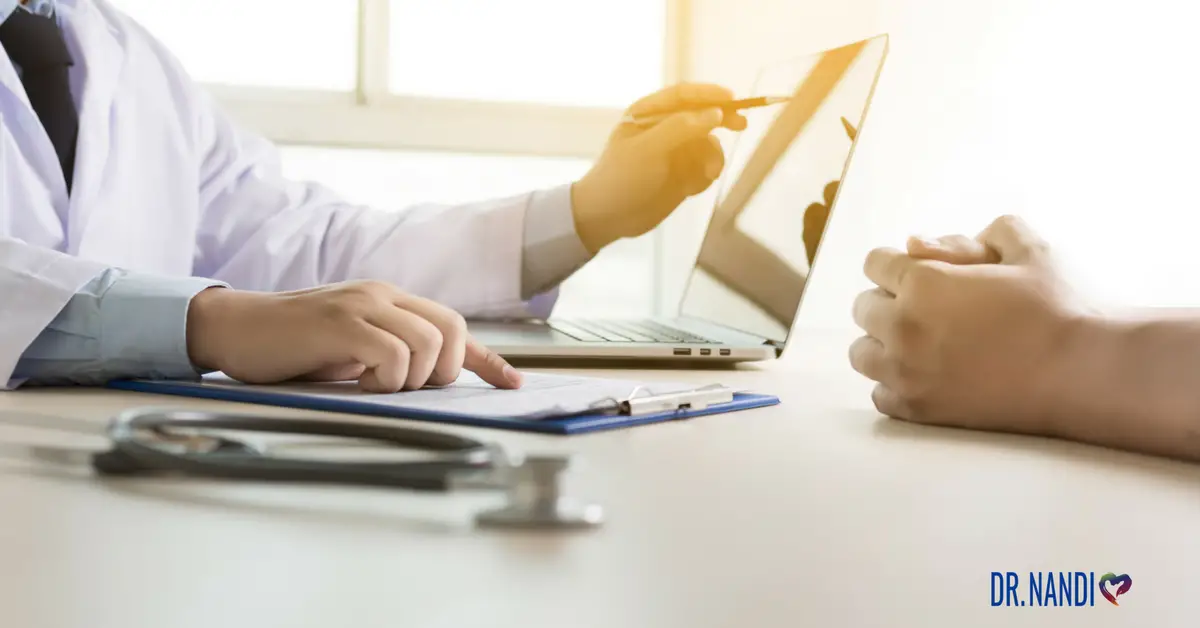You can be a #HealthHero by being an active participant in your doctor visits. Clear, honest, and open communication between your doctor and you are key to being able to create the best plan for you and your unique health needs.
If you go into your doctor’s office without preparing, it can be easy to forget important details, feel shy about symptoms, or forget questions you wanted to ask.
On this page, we have gathered Physician Visit Checklists for you to take with you to your appointments. These will help you know what information to bring with you to your doctor, what questions to ask, and some things you can expect. Here you can also find our top 8 tips for having a successful doctor’s visit.
There is a general doctor visit checklist as well as PDFs made for specific conditions/symptoms. You can print these out and use them as a resource when you go to your medical professional.
Physician Visit Checklists
The checklists are divided into 8 sections.
- Condition. What condition are you coming to the doctor for, or what condition do you suspect you may have?
- Symptoms I Am Experiencing. Potential symptoms of the above condition will be listed so you can circle all that apply. You can also write in your own if you are having symptoms that aren’t listed.
- Frequency Of Symptoms. Write the frequency you experience each symptom.
- I Have Treated/Managed By Symptoms By The Following. Explain any medications you have used, lifestyle treatments, and natural remedies.
- Family History. Here you will list any family members/relatives who have had similar problems or who were diagnosed with a similar condition.
- Other Medications I Am Currently Taken Not Related To (condition). List any medications you are taking regularly.
- Questions I Have For The Doctor. There will be a comprehensive list of questions related to your symptoms/condition that you may want to ask your doctor. You can also use this section to write your own questions so you don’t forget.
- Possible Diagnostic Tests. Tests doctors may want to run as well as brief explanations so you know what they entail.
8 Tips For A Successful Doctor Visit
According to recent statistics, 77% of patients go to the doctor having done no preparation beforehand for the visit. Many medical offices schedule appointments for 20 minutes or less, and if you’re not ready to take full advantage of the time you’re given you will likely leave disappointed and without the answers, you were hoping for.
Both your doctor and you will be more productive if you come prepared, knowing what you want to talk about and the results you want to leave with. Here are some tips to help you have the most successful visit possible.
#1 Do Your Research
Use reputable websites and books to study up on your symptoms and possible conditions you may be experiencing. Become familiar with possible tests your doctor may want to run as well as treatment options you can ask about.
Some reputable websites you can visit:
- https://www.nih.gov/
- https://medlineplus.gov/
- https://www.mayoclinic.org/
- https://www.nhlbi.nih.gov/
- http://diabetes.org/
- https://www.drugs.com/
- https://my.clevelandclinic.org/health
- https://familydoctor.org/
#2 Write Down All Your Symptoms +Frequency You Experience Them
Come with all your symptoms and symptoms frequency written down on paper. If you have them prepared this way, it will save you time trying to remember them all during your visit. It is easy to forget or leave out important symptoms if you try to do it based on memory, and symptoms are your doctor’s biggest clues as to what may be going on. If you don’t give all your symptoms, even ones that may seem insignificant, your doctor may not be able to find the root of your problems.
#3 Write Down All Your Questions And Concerns
Take some time to think about what questions you want your doctor to answer. It is also a good idea to prioritize them so that you get to the most important ones first. You can use the Physicians Checklists for ideas of what questions may help to get you the answers you need. You can also use the paper to write down important things your doctor says so you don’t forget once you leave.
#4 Speak Up
Some people get “stage fright” when they are in their doctor’s office and don’t say much. Your doctor will be likely to spend more time with you if you come ready to ask your questions and speak clearly about your thoughts and concerns. If it helps, try rehearsing your questions before your visit. Remember, there are no bad questions! Your doctor isn’t expecting you to be a medical expert, and it is better you ask your questions even if you think they are silly.
#5 Bring A Family Member Or Friend
Sometimes having a close family member or friend with you can help you feel more relaxed and confident during your visit. They may also think of different questions for your doctor and can advocate for you and what you need. If they live with you, they may also have a unique and useful perspective on your lifestyle and the symptoms you’ve been experiencing.
When choosing someone to bring along, make sure they are an individual who is respectful and tactful so that they don’t cause you stress or embarrassment during your visit.
#6 Write Down All Medications/Supplements And Bring Them Along
The medications and supplements you take regularly are very important for your doctor to be aware of. Write down all pharmaceuticals, supplements, vitamins, minerals, and any other substance you take frequently. It may be useful to bring them along if they are supplements/brands your doctor might not be familiar with. For example, natural herbal remedies or self-prescribed treatments that weren’t recommended by the doctor you are seeing.
#7 Remember, Your Doctor Works For You, Not Vise-Versa
Your doctor is a medical professional that you are hiring to support you in gaining/maintaining vibrant health. You should feel completely comfortable and trusting of their advice and treatment recommendations. If you don’t mesh with them well, or if they don’t listen to you or give you the time you need, don’t be afraid to find another doctor to work with. Patients who feel unlistened to during their visit or who don’t have a good relationship with their doctor are much less likely to follow their doctor’s recommendations. Find someone who respects you and who you also respect. A good relationship with your medical professional is vital to a successful healing journey.
#8 Take Full Responsibility
Your doctor can only help you as much as you help yourself. Take full responsibility for your health by:
- Being 100% transparent about your lifestyle and health history
- Being honest about what struggles you have in making healthy choices
- Coming to your visit as prepared as possible
- Being committed to taking action based on the treatment plan you and your doctor agree on
Conclusion
You and your doctor should work as a team in helping you to regain good health and vitality. The more you participate in your doctor’s visit, and the more committed you are to implementing changes as needed, the better chances you have for healing.
Do you have any questions? Use the link below to submit them directly to Dr Nandi!




















